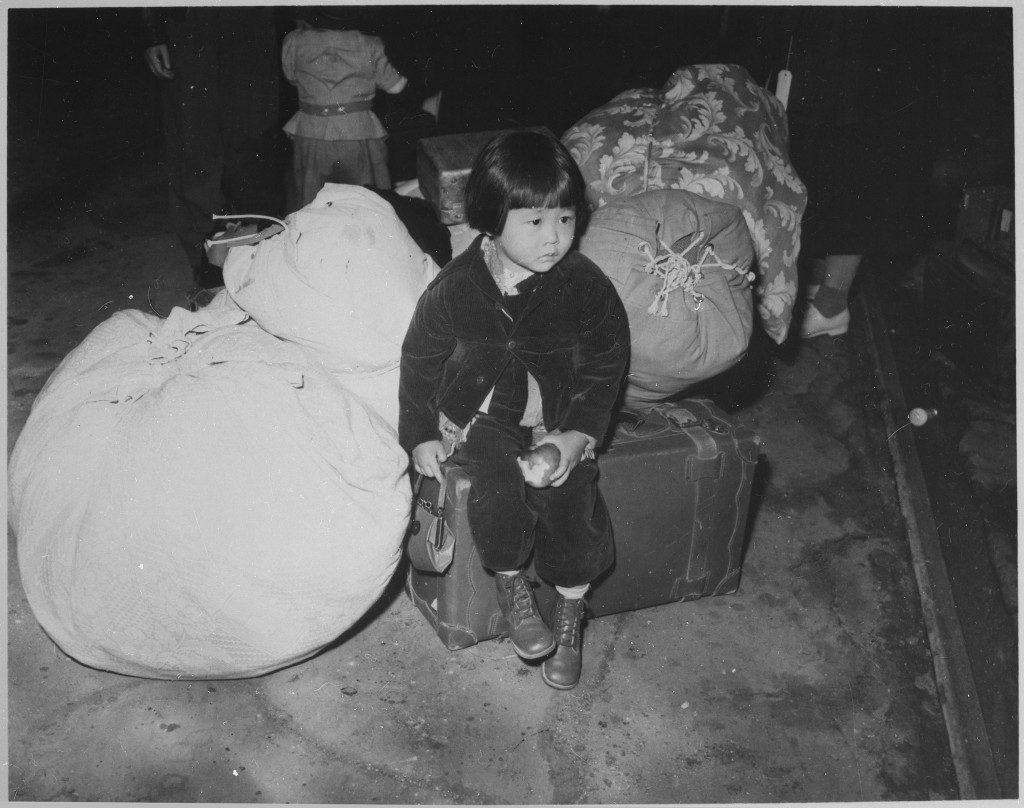Main Body
The Story of Joy Kogawa
Learning Goals
At the end of this lesson, you will be able to:
- Understand and use new vocabulary words
- Know what an antonym is
- Read words beginning with im- and in-
- Think about how some characters in a story might learn and grow
- Spell the plural form of many words
- Write a descriptive paragraph

Get Ready to Read
- Have you or someone you loved lived through a war? Did they survive? How did they get by?
Vocabulary
Figure out what the bold word means by looking at how it is used in the sentence. Match it to the best meaning.
| 1. Joy Kogawa remembers her childhood home fondly. | a. The army, navy and air force |
| 2. The RCMP said the decision to put all Japanese people in work camps did not make sense. | b. The Royal Canadian Mounted Police, also known as Mounties |
| 3. The military said the decision to put all Japanese people in work camps did not make sense. | c. In a loving way |
| 4. Joy Kogawa’s house stands as a reminder of the injustice of racism and war. | d. Unfair treatment |
Write an answer for each question using the word in bold. Write complete sentences.
- Do you have an old friend you think of fondly? Who is she or he?
- If you were going to be in the military, would you rather be a soldier, sailor, or pilot?
- Have you seen any injustices in the news lately?
Word Attack Strategy
Word Patterns
The prefixes in– and im– mean not.
For example, incomplete means not complete.
Complete and incomplete are antonyms, or opposites. Match the word to its antonym.
| Word | Antonym |
| 1. patient | incorrect |
| 2. moral | impolite |
| 3. possible | impossible |
| 4. correct | imperfect |
| 5. perfect | impatient |
| 6. polite | immoral |
Fill in the blanks with an im- or in- word from above.
7. Only two of my answers on the test were ________________.
8. It is __________________________ not to say thank you.
9. Some people find beauty in things that are __________________________. These things are more interesting.
10. Nelson Mandela said, “It always seems __________________________ until it is done.”
11. I sat in the waiting room of the doctor’s office, feeling ________________.
12. Ernest Hemingway said, “I know only that what is moral is what you feel good after and what is __________________________ is what you feel bad after.”
Use Your Reading Skills
Read The Story of Joy Kogawa in your reader. Return to this page when you are done.
Check Your Understanding
Find the Topic and Main Idea
1. What is the topic of this text?
a. Japanese Canadians
b. Joy Kogawa
c. A book called Obasan
2. What is the main idea of this text?
a. This text tells the story of how Joy Kogawa worked for justice for Japanese Canadians who were forced to live in camps during World War II.
b. This text is about the advantages of Joy Kogawa’s house.
c. This text is about why Obasan is a great book.
3. Open and print a Sum It Up sheet. Use the sheet to plan a summary of this text. In the details boxes, list two things that Joy did to stand up for the Japanese Canadians who were put in camps.
4. Using your answers above, write a short summary of this text. Include the topic, main idea, and one or two supporting details.
Understanding Characters
Characters are the people in a story. Events in the story often cause characters to learn and grow.
Answer these questions with a sentence.
1. At first, Joy thought of herself as a white person. What event caused Joy to accept herself as Japanese Canadian?
_________________________________________________________________
2. At first, the Government of Canada thought Japanese Canadians could be spies. What events helped the Government of Canada realize this was wrong?
______________________________________________________________________
3. At first, most white Canadians stood by while Japanese Canadians were forced into work camps. What helped white Canadians to realize this was wrong?
______________________________________________________________________

Grammar
Review Commas in a Series
Add commas to these sentences, as needed. (Not all of these sentences need commas.)
1. The walls were covered with paintings photos and bookcases.
2. The sounds of music storytelling and laughter sailed through the air.
3. Her bedroom had toy boxes filled with cars dolls and games.
4. Joy’s mother father and brother were forced to move to a work camp in Slocan.
5. Joy missed her friends her books and the cherry tree in her yard.
6. When Joy grew up she wrote books poems and letters.
7. She helped Canadians understand the injustice of racism and war.
Plural Nouns
Grammar Rule
A singular noun refers to just one person, place, or thing.
A plural noun refers to many people, places, or things.
Here are some rules for making nouns plural:
| Singular | Plural | Rule |
|
One dog One cup One ear |
Two dogs Two cups Two ears |
To make most nouns plural, add –s. |
|
One dish One branch One bus One fox |
Two dishes Two branches Two buses Two foxes |
For nouns ending in –sh, –ch, –s, or –x, add –es. |
|
One baby One cherry |
Two babies Two cherries |
For nouns ending in a consonant + y, change the y to an i and add –es. |
Make these words plural.
|
1. toy 2. match 3. book 4. spy 5. box |
6. shack 7. farm 8. field 9. letter |
10. kiss 11. story 12. bush 13. boy |
Choose a word from the list to complete each sentence. The word might be singular or plural.
14. The Canadian government thought that Japanese Canadians could be ____________________.
15. Joy’s belongings were packed into _____________________ and sold.
16. Joy had to go live in a _______________________.
17. She missed her __________________________.
18. Her family had to work in a beet ______________________.
Adjectives
Adjectives are words that describe nouns. Adjectives make our sentences clear and creative.
Compare the sentences with and without adjectives. Which is better?
- Viola spent a night in a jail cell.
- Viola spent a lonely night in a dirty, grey jail cell.
- Nellie McClung gave speeches.
- Nellie McClung gave bold, lively speeches.
Rewrite the sentences with adjectives to make them more clear and creative.
1. My sister bought a truck.
2. We could see the cabin up ahead.
3. Our holiday was cut short by a snowstorm.
4. A crowd gathered to watch the fireworks.
5. The children took swimming lessons at a pool.
6. My son showed off his wedding ring to the family.
Writing
Describing Home
1. Re-read the first paragraph of the reading.
The topic of this paragraph is Joy’s childhood home. To bring the description to life, the writer described how it looked, sounded, and smelled.
2. Describe some things you might see in Joy’s childhood home.
_____________________________________________________________
3. Describe something you might smell in Joy’s childhood home.
_____________________________________________________________
4. Describe some things you might hear in Joy’s childhood home.
_____________________________________________________________
Now think about the places you have called home — even if it was only for one night. What place did you like the best? Try to use your senses to describe it.
5. What did it look like?
_____________________________________________________________________
6. How did it smell?
_____________________________________________________________
7. Describe the sounds you often heard there.
_____________________________________________________________
8. Was there any furniture you really liked? What did it feel like?
_____________________________________________________________
Writing Task
Use your answers above to write a paragraph describing your favourite home. Use adjectives in your paragraph. For an added challenge, try using commas as well.
When you are done, use this checklist to edit your paragraph:
- Did I begin with a topic sentence that says what I am writing about?
- Did I include supporting details about how the home looks, smells, sounds, and made me feel?
- Did I end with a concluding sentence?
- Are all of my sentences complete?
- Did I use commas correctly?
- Did I use adjectives correctly?
- Did I spell plural words correctly?
Hand in your paragraph to your instructor.
Answer Key
| Vocabulary | |
| QUESTION | ANSWER |
| 1 | c |
| 2 | b |
| 3 | a |
| 4 | d |
| Word Attack Strategy | |
| QUESTION | ANSWER |
| 1 | patient – impatient |
| 2 | moral – immoral |
| 3 | possible – impossible |
| 4 | correct – incorrect |
| 5 | perfect – imperfect |
| 6 | polite – impolite |
| 7 | incorrect |
| 8 | impolite |
| 9 | imperfect |
| 10 | impossible |
| 11 | impatient |
| 12 | immoral |
| Check Your Understanding | |
| Find the Topic and Main Idea | |
| QUESTION | ANSWER |
| 1 | b |
| 2 | a |
| Understanding Characters | |
| QUESTION | ANSWER |
| 1 | Writing her book, Obasan |
| 2 | The Government of Canada changed its mind because Canadians held meetings, wrote letters, and organized rallies. |
| 3 | Joy’s book, Obasan, helped white Canadians realize that what had happened to Japanese Canadians was wrong. |
| Grammar | |
| Review Commas in a Series | |
| QUESTION | ANSWER |
| 1 | The walls were covered with paintings, photos, and bookcases. |
| 2 | The sounds of music, storytelling, and laughter sailed through the air. |
| 3 | Her bedroom had toy boxes filled with cars, dolls, and games. |
| 4 | Joy’s mother, father, and brother were forced to move to a work camp in Slocan. |
| 5 | Joy missed her friends, her books, and the cherry tree in her yard. |
| 6 | When Joy grew up, she wrote books, poems, and letters. |
| 7 | no commas required |
| Plural Nouns | |
| QUESTION | ANSWER |
| 1 | toys |
| 2 | matches |
| 3 | books |
| 4 | spies |
| 5 | boxes |
| 6 | shacks |
| 7 | farms |
| 8 | fields |
| 9 | letters |
| 10 | kisses |
| 11 | stories |
| 12 | bushes |
| 13 | boys |
| 14 | spies |
| 15 | boxes |
| 16 | shack |
| 17 | toys |
| 18 | field |
| Writing | |
| QUESTION | ANSWER (answers may vary) |
| 2 | The house had walls covered with paintings, photos, and bookcases. The bedroom had lots of toys. The yard had a cherry tree. |
| 3 | The house smelled like the wood burning in the fireplace. |
| 4 | The sounds of music, storytelling, and laughter filled the house. |
Attributions
A soldier
Soldier by babtisteh is in the public domain.
Waiting to be sent to a camp
A young evacuee of Japanese ancestry waits with the family baggage by US National Archives bot is in the public domain.

